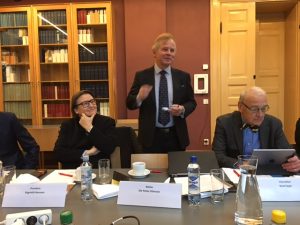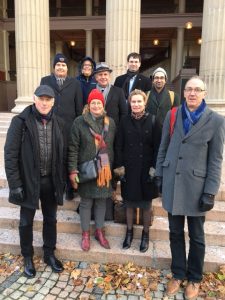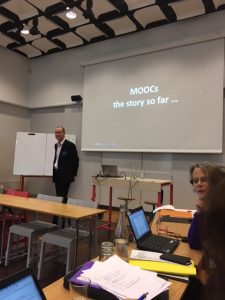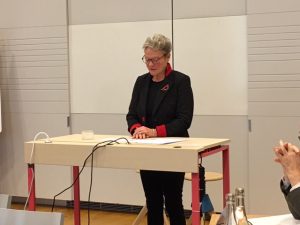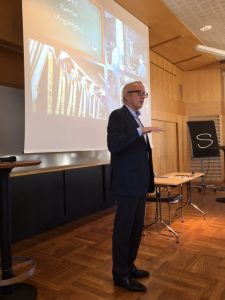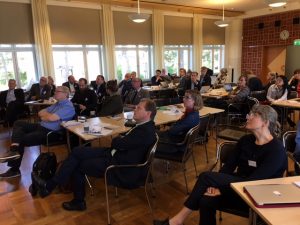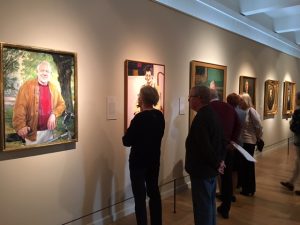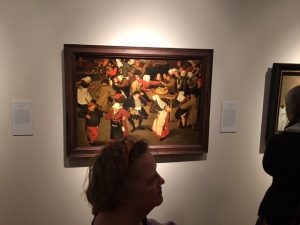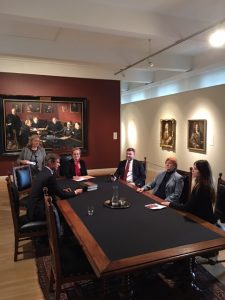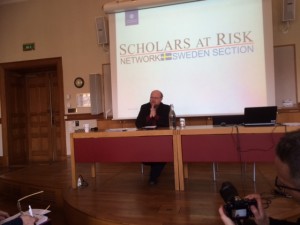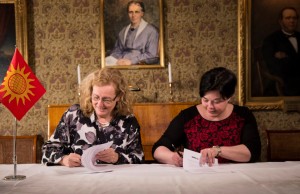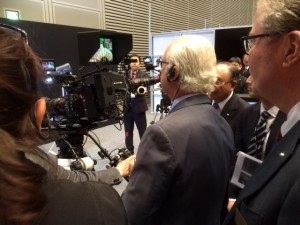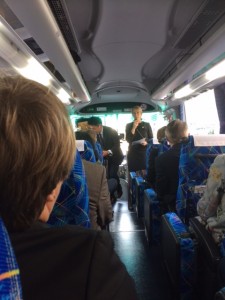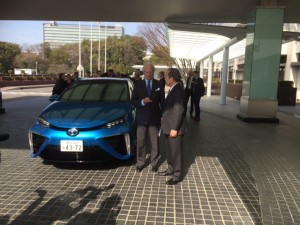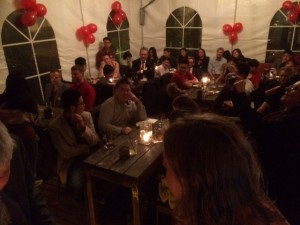2015 has been a dramatic year internationally, with wars, refugee crises, terrorism and looming climate change. These issues both affect and engage Sweden—and Uppsala University—in a multitude of ways. In our Mission Statement, we say that the overall objective of Uppsala University is to gain and disseminate knowledge for the benefit of humankind and a better world. We have a moral responsibility, and many people at our University have contributed their expert knowledge.
At the same time, we continue the important day-to-day work of ensuring that both education and research, as the long-term societal investments they are, can be provided the necessary means for the future. Many people have contributed to this:
- Kristina Edström led the work on the University’s input on the upcoming research bill, which resulted in ten recommendations for the Swedish Government.
- Torsten Svensson leads the work on drafting the framework for our University’s upcoming educational evaluation system.
- Hans Ellegren conducted a follow-up assessment of our previous two research evaluations (Quality and Renewal 07 and 11) and pointed the way for the new evaluation (Q&R 17) to be launched next year.
- Mats Larhed heads a team tasked with improving our career system in various ways, not the least of which being how to increase the amount of merited appointments.
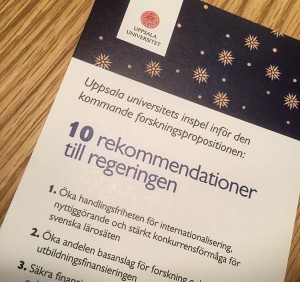
To us in the University Management, some of the most pressing matters are those relating to the University’s autonomy and strategic integrity and how we, in the long term, can affect our own development. These questions are crucial when we claim ownership of quality issues against the government. They are also vital when we argue for the need for increased economic freedom of action (that is, increased direct state funding) in order to effectively conduct the strategic renewal requested both by ourselves and other stakeholders. They are also recurrent in the discussions on university governance which have intensified in the wake of Kåre Bremer’s recent report, currently referred to us for consideration.
Uppsala University continues to do well. Our educational programmes and courses remain highly popular. The number of international students from outside Europe is growing steadily. We were named the Student City of the Year in 2015. Our research revenue is increasing, and we keep our position among the top 100 universities in the international rankings. This December, a new type of ranking of the world’s most influential universities was published, based on the quantity of Wikipedia references in 24 different languages. Uppsala University shows up on this exclusive list as number 15 world-wide!
Inside and between our faculties and departments, exciting interdisciplinary research collaborations are increasing—antibiotics, medicinal technology, migration, racism and labour market research are examples of such boundary-spanning areas. The University has launched new policy programmes for sustainable development and internationalisation. We hosted the National Equal Opportunity Conference. We have initiated projects on active student participation and ways of using our cultural heritage as a pedagogic resource. An evaluation of the organisation of Campus Gotland found that there are many positive developments, but also that some organizational issues would benefit from fresh approaches.
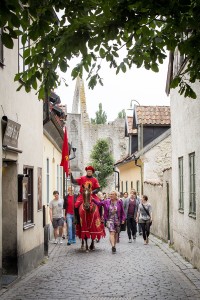
We are broadening and strengthening our collaboration with industry and society. Our relationship to the County Council and Uppsala University Hospital is under constant development. Earlier this year, we entered a strategic partnership with ABB and are planning several similar agreements, for instance with the City of Uppsala. Uppsala Health Summit took on antibiotic resistance this year, drawing participants from 33 countries. The cultural collaboration project The Good City, with seminars, workshops, walking tours of the city and ten sold-out performances of West Side Story, captured the attention of many private and public actors in Uppsala. More than 8000 people came to the Elton John concert in the Botanical Garden. Our collaborative partners IK Sirius Fotboll and Uppsala Basket had their best seasons in years. In addition, the University Management defeated SLU (the Swedish University of Agricultural Sciences) in the Uppsala Academic Rowing Race!

As the University evolves, new premises are needed. We are pleased to see the law students enjoy their new location in the Munken Block, and that the Humanist Theatre in the English Park is on the verge of becoming a reality. The Segerstedt Building is coming along well, and the planning of the Ångström IV is underway. Campus Gamla Torget is undergoing reconstructive work, and in February, renovations are set to begin on the University Main Building. There has also been great progress in the way we plan for and prioritise among new investments in research infrastructure, within Uppsala University as well as nationally.
Uppsala University attracts a good deal of attention in old and new media alike. Some news stories stick out and get global coverage, like the news about the correlation between asthma in children and exposure to dogs, as well as the life expectancy calculator (sometimes referred to as the ‘death test’). It was also great to listen to Maria Strømme and her episode of the popular Swedish summer radio show Sommar i P1. She planted the notion of nanotechnology in the collective Swedish consciousness. Another highlight was the Nobel laureates’ traditional Lucia visit to Uppsala. But our 102-year-old alumnus Gösta Vestlund was perhaps the guest of honour who attracted the most media attention during that occasion.
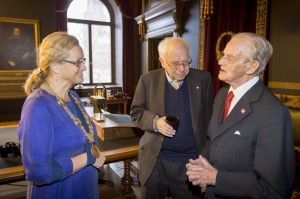
Through travels and meetings, we promote the University internationally. A collaboration between six Swedish universities entitled SACF (the Swedish Academic Collaboration Forum) involved several trips abroad, for instance to China and South Korea. Sweden’s strong reputation as innovative opens new paths to collaborative ventures. We visited the US to strengthen the bonds with friends and alumni. Back home, we have enjoyed a rapid succession of visits.
This turned out to be quite a long annual chronicle, with reflections both large and small, but then again, many things happen in one year across our broad University. The University owes its fantastic achievements to its competent and devoted staff as well as its talented and ambitious students. It is a privilege to work with and for you all!
Now, a well-deserved holiday break awaits us all, after which we will resume our common goal of advancing Uppsala University’s positions further in 2016!
Eva Åkesson
Anders Malmberg
Katarina Bjelke
Stellan Sandler
Torsten Svensson
Johan Tysk

